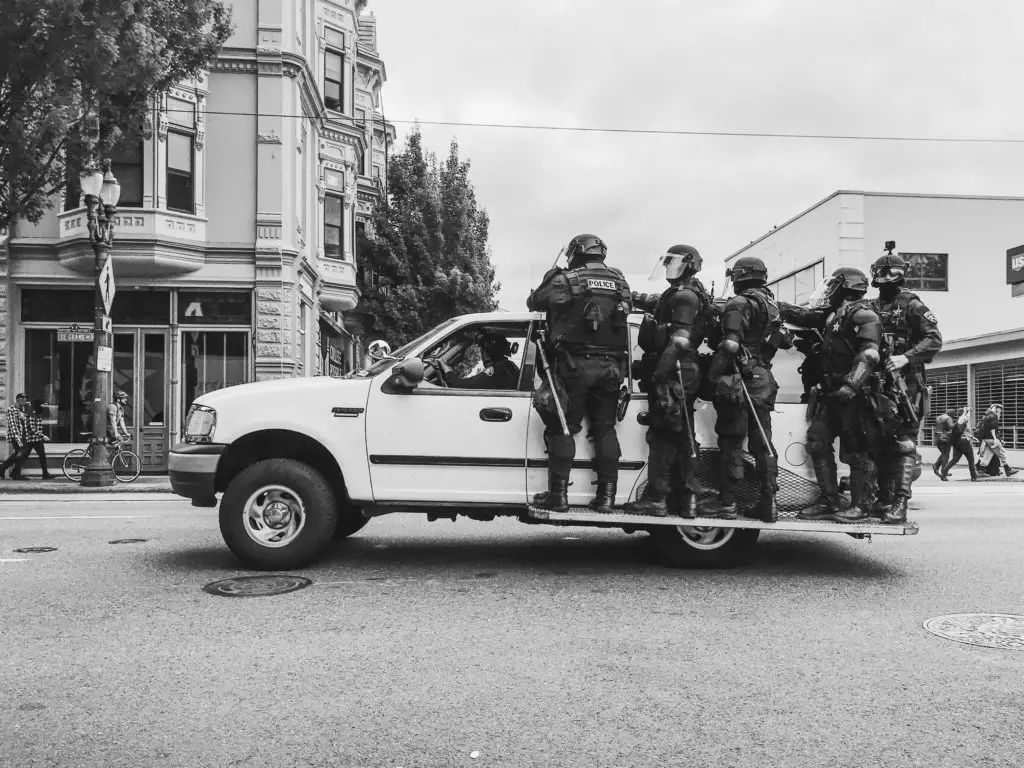A TikTok lawyer has shared his legal insight on a viral video, of which the SWAT arrests a bystander for filming them on his property.
Ugo Lord, 28, who has 6.7 million followers on the app, reacted to a clip that showed a SWAT team arresting a man who was standing on his property and recording them with his phone.
The Controversial Video
In a recent viral TikTok video, attorney Ugo Lord addresses a controversial incident involving a SWAT team and a bystander. The bystander, standing on his porch, was recording an ongoing police operation. Despite claiming his right to record on his private property, he was arrested by the SWAT team for alleged misconduct.
“Ayy! You ain’t supposed to smack him like that? What is wrong with you?” the bystander says, as he sees a SWAT officer hitting a suspect.
After that, the SWAT team notices the bystander and tells him to go back in the house.
“Man, I’m on my property. You can’t come over, do nothing to me.”
“You got a search warrant?” the bystander says, as the SWAT team approaches him.
“Get in the house!!!” one of the officers yells.
“I got y’all on the camera right now! I’m on my private property,” the bystander says, holding up his phone.
“It’s called misconduct. You’re under arrest,” another officer says, as he grabs the bystander and tries to arrest him.
“For what!!??” the bystander asks, as they take him away.
Attorney’s Reaction
Attorney Lord’s explaining the arrest of a bystander filming SWAT. Credit: YouTube/UgoLord
Ugo Lord, who is a licensed attorney in the US, explained that the arrest was unlawful and violated the bystander’s constitutional rights.
“Law enforcement has the right to arrest any bystander that interferes with official police conduct,” he said.
“This man stood on his porch and recorded the entire incident without interfering.”
He added that courts have ruled that recording police officers and even yelling at police officers is a constitutionally legal activity under the First Amendment, which guarantees freedom of speech.
Related Legal Research And Rights
California Penal Code Section 148(g), which states that a person who takes a photograph or makes an audio or video recording of a public officer or peace officer, while the officer is in a public place or the person taking the photograph or making the recording is in a place he or she has the right to be, does not constitute a violation of the law, nor does it give the officer a reason to detain or arrest the person.
However, there are two limitations to the right of filming a police officer in California.
One is that a person who “willfully resists, delays, or obstructs” a police officer from conducting their duty may be punishable under California Penal Code Section 148(a). So there must be interference with the police.
The other is that it is not legal to record a police officer secretly or with a concealed camera under California Penal Code Section 647. Since California is a “two-party” consent state, it is still illegal to record someone, a police officer or not, without them expressing consent to the recording.
Did The SWAT Team Violate The Bystander’s Rights?
In the video, the bystander was openly recording the police operation from his property, which aligns with the rights protected under the First Amendment and the Tenth Circuit U.S. Court of Appeals ruling. He was not secretly recording, which would have been a violation under the limitation of California Penal Code Section 647.
Furthermore, the bystander did not appear to be willfully resisting, delaying, or obstructing the police operation, which would have been another violation. He was merely documenting the event from his property, which he has a right to do.
However, the SWAT team still arrested the bystander for alleged misconduct. In that case, their act can no longer be justified.
“It makes this arrest unjustifiable police force,” as Attorney Lord concluded in the video.
Eventually, this incident has highlighted the tension between the rights of individuals to document police activities and the perception of law enforcement that such actions may interfere with their duties.
Public Attention
Lord’s video has received over 20 million views, 1.3 million likes and 29,000 comments on YouTube, with many users supporting his legal analysis and condemning the SWAT team’s actions.
“If cops aren’t punished for violating your rights, you have no rights” one user wrote.
“My man recorded a 12 million dollar lawsuit in 4k” another user joked.
“The fact those cops were so fast to arrest him for standing on his porch and yelling & recording says a lot..” another sadly expressed.
Conclusion
This TikTok video and the legal discussion it has sparked remind us of the bigger picture. That is the ongoing conversation about our rights in our interactions with law enforcement.
It’s a great prompt for all of us to think about transparency, accountability, and how our rights are evolving in the digital age!


What was the actual fallout from this incident, or is it too early to know? Was the man compensated and/or the police disciplined? I sincerely hope so, otherwise ideas such as accountability and legal rights become merely theoretical.
My team looked into it but we haven’t been able to find follow-up information regarding this video. With that said, most instances where body camera footage is released to the public, it’s usually because an attorney (or the media) has submitted a formal request to the police department for them to be released. Consequently, it’s likely the man in the video retained counsel. Thanks for your question!
He got 20k.
He got $20,000. Look up NICHOLAS PETTIT, v. JAMES MORROW,
20K SETTLEMENT!
https://www.google.com/amp/s/www.nbc4i.com/news/local-news/aclu-columbus-agrees-to-20000-settlement-with-man-assaulted-arrested-for-filming-police/amp/